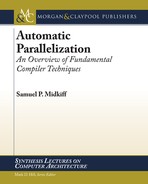0%
18Chapters
0-1Hours read
0kTotal Words
Book Description
Compiling for parallelism is a longstanding topic of compiler research. This book describes the fundamental principles of compiling "regular" numerical programs for parallelism. We begin with an explanation of analyses that allow a compiler to understand the interaction of data reads and writes in different statements and loop iterations during program execution. These analyses include dependence analysis, use-def analysis and pointer analysis. Next, we describe how the results of these analyses are used to enable transformations that make loops more amenable to parallelization, and discuss transformations that expose parallelism to target shared memory multicore and vector processors. We then discuss some problems that arise when parallelizing programs for execution on distributed memory machines. Finally, we conclude with an overview of solving Diophantine equations and suggestions for further readings in the topics of this book to enable the interested reader to delve deeper into the field. Table of Contents: Introduction and overview / Dependence analysis, dependence graphs and alias analysis / Program parallelization / Transformations to modify and eliminate dependences / Transformation of iterative and recursive constructs / Compiling for distributed memory machines / Solving Diophantine equations / A guide to further readingTable of Contents
- Cover
- Half title
- Copyright
- Title
- Contents
- Preface
- 1 Introduction and overview
- 2 Dependence analysis, dependence graphs and alias analysis
- 3 Program parallelization
- 3.1 Simple loop parallelization
- 3.2 Parallelizing loops with acyclic and cyclic dependence graphs
- 3.3 Targeting vector hardware
- 3.4 Parallelizing loops using producer/consumer synchronization
- 3.5 Parallelizing recursive constructs
- 3.6 Parallelization of while loops
- 3.7 Software pipelining for instruction level parallelism
- 4 Transformations to modify and eliminate dependences
- 5 Transformation of iterative and recursive constructs
- 6 Compiling for distributed memory machines
- 6.1 Data distribution
- 6.2 Computing the reference set
- 6.3 Computation partitioning
- 6.3.1 Bounds of replicated array dimensions
- 6.3.2 Bounds of block distributed array dimensions
- 6.3.3 Bounds of cyclically distributed array dimensions
- 6.3.4 Bounds of block-cyclically distributed array dimensions
- 6.3.5 Subscripts with multiple loop indices
- 6.3.6 Generating loop bounds for multi-dimensional arrays
- 6.3.7 Generating loop bounds with multiple references
- 6.4 Generating communication
- 6.5 Distributed memory programming languages
- 7 Solving Diophantine equations
- 8 A guide to further reading
- 8.1 Compiler fundamentals
- 8.2 Dependence analysis, dependence graphs and alias analysis
- 8.3 Program parallelization
- 8.4 Transformations to modify and eliminate dependences
- 8.5 Reduction recognition
- 8.6 Transformation of iterative and recursive constructs
- 8.7 Tiling
- 8.8 Compiling for distributed memory machines
- 8.9 Current and future directions in parallelizing compilers
- Biography
- Author’s Biography
